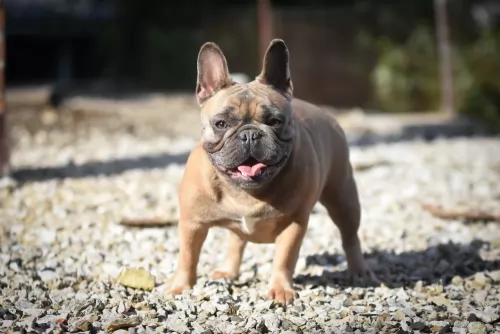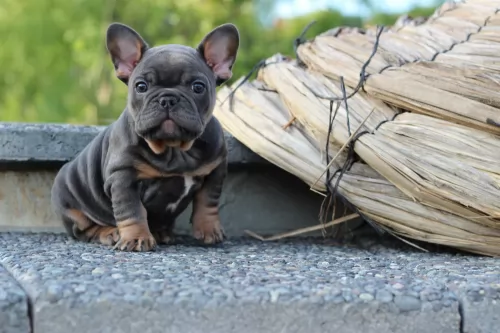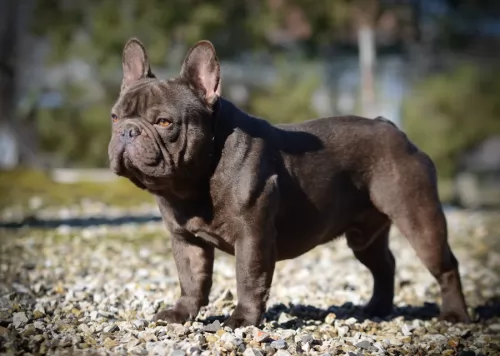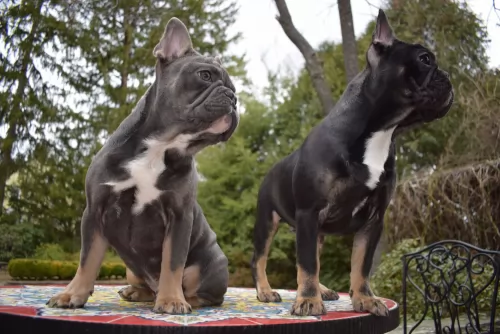 Petzlover
Petzlover French Bulldog is originated from France but Bichon Frise is originated from Spain. Both French Bulldog and Bichon Frise are having almost same height. Both French Bulldog and Bichon Frise are having almost same weight. French Bulldog may live 7 years less than Bichon Frise. Both French Bulldog and Bichon Frise has almost same litter size. Both French Bulldog and Bichon Frise requires Low Maintenance.
French Bulldog is originated from France but Bichon Frise is originated from Spain. Both French Bulldog and Bichon Frise are having almost same height. Both French Bulldog and Bichon Frise are having almost same weight. French Bulldog may live 7 years less than Bichon Frise. Both French Bulldog and Bichon Frise has almost same litter size. Both French Bulldog and Bichon Frise requires Low Maintenance.
 The french bulldog originated in England and are bred expecting small size bulldogs. Many lace workers in Nottingham had little bulldogs and when they emigrated to france, they brought their dogs with them. Soon they become popular in France and Europe. Then Americans showed interest in them.In 1896 frenchie was shown in United states in a show and after that they got their nickname "Frechie".
The french bulldog originated in England and are bred expecting small size bulldogs. Many lace workers in Nottingham had little bulldogs and when they emigrated to france, they brought their dogs with them. Soon they become popular in France and Europe. Then Americans showed interest in them.In 1896 frenchie was shown in United states in a show and after that they got their nickname "Frechie".
 Contrary to the myths and many of the tales of the history of the Bichon Frise, the breed was originally developed in Spain. Later specific trait development occurred in France to give us the lap dog Bichon Frise that we know today. The original Spanish dog – the Bichon – was a water – sailing dog. It was descended from the poodle breeds crossed with either the water spaniels or the Barbet. These early dogs were friendly and happy and because of this, sailors carried them with them on their ships and even bartered them for supplies. Prior to the 14th century the Spanish probably brought them to the Canary Islands. Later in the 14th century they we discovered again by Italian sailors who returned them to Europe where they lived in the courts of the nobility. During the Renaissance and after the French fell in love with the breed while the Spanish continue to enjoy their presence.
Contrary to the myths and many of the tales of the history of the Bichon Frise, the breed was originally developed in Spain. Later specific trait development occurred in France to give us the lap dog Bichon Frise that we know today. The original Spanish dog – the Bichon – was a water – sailing dog. It was descended from the poodle breeds crossed with either the water spaniels or the Barbet. These early dogs were friendly and happy and because of this, sailors carried them with them on their ships and even bartered them for supplies. Prior to the 14th century the Spanish probably brought them to the Canary Islands. Later in the 14th century they we discovered again by Italian sailors who returned them to Europe where they lived in the courts of the nobility. During the Renaissance and after the French fell in love with the breed while the Spanish continue to enjoy their presence.
In the late 19th century in France the breed fell out of popularity and became street dogs and circus and fair dogs. They also worked with organ grinders and assisted the blind. In the early 20th century, the Societe Centrale Canine, the National Kennel Club of France, adopted the breed’s official standard – while they were still known as both the Bichon and the Tenerife. The popularity of the breed at this time is heavily attributed to “The Adventures of TinTIn” , by Herge, which featured a small, white, fluffy fox terrier. Then the president of the Federation Cynoloqique Internationale presented a new name for the breed based on its characteristics. The name Bichon Frise kept the Bichon heritage and added “curly” the meaning of Frise. Under this name the breed was admitted to the Societe Centrale Canine stud book in October of 1934.
The Bichon Frise came to the United States for the first time in 19554 and was admitted to the American Kennel Club Stud Book in 1972. They entered the non-sporting group of the AKC in 1973. By 2001 the Bichon Frise, J.R., won the Westminster Dog Show. In 1976, the Bichon Frise came to Australia, imported by Harry and Margaret Begg who oversaw the growth of the breed there. Today there are 4 separate breeds believed to be descended from the original Bichon/Tenerife breeds – the Bichon Frise, the Bichon Bolognaise, the Maltese and the Havanese.
 Frenchie is a good companion dog and has a powerful muscular body. They like to play but also likes to relax for more time. They are intelligent and training them is very easy until they think it a game. They are free thinkers and are not very good in obedience. Frenchies should not be leaved alone for a long time.They love spending time with humans and generally they get along with everyone. They are excellent watchdogs and alerts when strangers come.
Frenchie is a good companion dog and has a powerful muscular body. They like to play but also likes to relax for more time. They are intelligent and training them is very easy until they think it a game. They are free thinkers and are not very good in obedience. Frenchies should not be leaved alone for a long time.They love spending time with humans and generally they get along with everyone. They are excellent watchdogs and alerts when strangers come.
French bulldog suits very well in apartments. But they should be made to walk for fifteen minutes daily to avoid over weight. They should not be kept outside on hot days. Frenchies will be very happy if you stay in home. They will follow you wherever you walk inside the house. They love people so much, such that people who own a Frenchie can not imagine life without them.
 The modern Bichon Frise is a white, small dog with a round skull and muzzle. The nose should be black and the eyes round and dark. Depending on the size of the dog, the legs and head are proportionate to the body, while the tail should be curly and long. Both the tail and the ears must not be docked. Their coat is as hypoallergenic as a dog gets. It is white, dense and for most Bichon Frise, it is curly. They should have black lips as well.
The modern Bichon Frise is a white, small dog with a round skull and muzzle. The nose should be black and the eyes round and dark. Depending on the size of the dog, the legs and head are proportionate to the body, while the tail should be curly and long. Both the tail and the ears must not be docked. Their coat is as hypoallergenic as a dog gets. It is white, dense and for most Bichon Frise, it is curly. They should have black lips as well.
 They are good children friendly dogs as they like to play with them. It will be good if they are supervised by an adult.
They are good children friendly dogs as they like to play with them. It will be good if they are supervised by an adult.
They are polite with everyone including other pets. They love to play games and chase balls but don't need much exercise.
Frenchies adapts well for apartment living but they don't like being alone for long time. They will not tolerate both hot and cold weather and so air conditioning will be better.
French Bulldogs are easy to train and are very much interested in playing.
 The Bichon Frise, according to the American Kennel Club is a cheerful and merry dog. They are gentle, playful, sensitive and affectionate. These dogs love people, are very social and like other dogs as well. They love to play with children and they are intelligent and affectionate. They were developed in their latter stages by the French to be “lap dogs” or companion animals. They are not territorial by nature but can become so if confined and encouraged. Start obedience training early and be consistent throughout their lives. They take to training easily if positive techniques are used. They do however, have a reputation for not taking well to housetraining. Be persistent
The Bichon Frise, according to the American Kennel Club is a cheerful and merry dog. They are gentle, playful, sensitive and affectionate. These dogs love people, are very social and like other dogs as well. They love to play with children and they are intelligent and affectionate. They were developed in their latter stages by the French to be “lap dogs” or companion animals. They are not territorial by nature but can become so if confined and encouraged. Start obedience training early and be consistent throughout their lives. They take to training easily if positive techniques are used. They do however, have a reputation for not taking well to housetraining. Be persistent
 Frenchies can suffer from Von Willebrand's disease(VWD)and thyroid condition. Due to their flat faces they suffer from elongated soft palate or cleft palate. Because of their compacted air way they have inability to effectively regulate temperature.
Frenchies can suffer from Von Willebrand's disease(VWD)and thyroid condition. Due to their flat faces they suffer from elongated soft palate or cleft palate. Because of their compacted air way they have inability to effectively regulate temperature.
Any indication that the hair is unhealthy, such as brittleness and hair loss, should be addressed immediately to avoid any further damage. Hair loss becomes a problem when it becomes excessive, possibly due to disease or a particular condition.
 The coat of the Bichon Frise can easily become matted if not brushed or combed every day. Severe matting can lead to a hematoma in their ears. They are also very prone to ear infections so paying a lot of attention to their ears is imperative. They are will chew and scratch themselves if not groomed well and this can cause skin infections and conditions. They might have allergies to fleas, pollen, chemicals, and dust. The patella (knee cap) can be loose, diabetes, cataracts and heart disease also affect the Bichon Frise. In the United Kingdom the number one cause of death for the breed is old age -13 plus years, with 21% dying of cancer. In North America cancer is the number one killer as it is for most dogs. The Bichon might also be afflicted with hematologic disorders such as AIHA (Autoimmune hemolytic anemia) and ITP (Immune-mediated thrombocytopenia) which while less common than cancer will kill the dog much earlier in life than cancer. The other condition that the Bichon Frise is prone to are liver shunts. If found early they can be surgically corrected but most are not, and liver failure is eventually the cause of death.
The coat of the Bichon Frise can easily become matted if not brushed or combed every day. Severe matting can lead to a hematoma in their ears. They are also very prone to ear infections so paying a lot of attention to their ears is imperative. They are will chew and scratch themselves if not groomed well and this can cause skin infections and conditions. They might have allergies to fleas, pollen, chemicals, and dust. The patella (knee cap) can be loose, diabetes, cataracts and heart disease also affect the Bichon Frise. In the United Kingdom the number one cause of death for the breed is old age -13 plus years, with 21% dying of cancer. In North America cancer is the number one killer as it is for most dogs. The Bichon might also be afflicted with hematologic disorders such as AIHA (Autoimmune hemolytic anemia) and ITP (Immune-mediated thrombocytopenia) which while less common than cancer will kill the dog much earlier in life than cancer. The other condition that the Bichon Frise is prone to are liver shunts. If found early they can be surgically corrected but most are not, and liver failure is eventually the cause of death.
 As with all dogs, proper nutrition makes your French Bulldog a happy, healthy pup. He should have his own food and water bowls. Don't feed your French bulldog puppy, uncooked meat or food that may have gone bad. Young puppies need relatively large amount of food in order to meat the demands of their rapidly growing bodies and their hectic lifestyle. Feed your puppy specially designed chewing treats from reputable pet stores.
As with all dogs, proper nutrition makes your French Bulldog a happy, healthy pup. He should have his own food and water bowls. Don't feed your French bulldog puppy, uncooked meat or food that may have gone bad. Young puppies need relatively large amount of food in order to meat the demands of their rapidly growing bodies and their hectic lifestyle. Feed your puppy specially designed chewing treats from reputable pet stores.
According to the French BullDog Club of America, there are no specific guidelines for feeding them. Options for feeding your French Bulldog are commercial dry food, canned food, raw food and homemade meals. Calories required for frenchie varies depending on size, age, activity level and metabolism.
Frenchies can be made to walk or run for a particular distances. Heavy exercises should not be given as they face respiratory problems. Avoid exercising them in hot weather as they have chances of getting heatstroke.
 Being a small dog, the Bichon Frise is susceptible to obesity and that condition will be terminal in the end for this breed. So make sure you do not overfeed your Bichon Frise. The same is true with the use of treats. The Bichon loves treats and loves the association with treats of having pleased you. They should be fed small meals – about ¼ cup of good high quality dry food twice a day.
Being a small dog, the Bichon Frise is susceptible to obesity and that condition will be terminal in the end for this breed. So make sure you do not overfeed your Bichon Frise. The same is true with the use of treats. The Bichon loves treats and loves the association with treats of having pleased you. They should be fed small meals – about ¼ cup of good high quality dry food twice a day.
As previously mentioned the Bichon Frise is susceptible to:
Hematomas and infections of the ear if not groomed well and consistently.
Cancer is number one killer.
Hematological Issues are deadlier than cancer.
Liver shunts are a very serious concern.
Though the Bichon Frise is not an overly active dog, they do love to play. They are characterized by short bursts of activity followed by long periods of rest. They can be worn out just by running around the house. You must play with them everyday as well as take them on a walk each day. Bichons are fast and agile and do well in agility trials. They also like to compete in rally and obedience trials. Most of all they love to and need to play with their people every day.